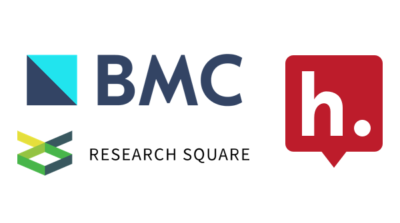BMC Adds Hypothesis Annotation to Enable Community Feedback During Peer Review
 BMC, Research Square, and Hypothesis are excited to announce a new collaboration designed to promote transparency, early sharing, and encourage community feedback through annotation during the peer review process. In keeping with its long history in experimentation around new types of peer review, BMC has partnered with Research Square to develop In Review, a platform for showcasing manuscripts submitted to four BMC titles: Trials, BMC Anesthesiology, BMC Ophthalmology, and BMC Neurology.
BMC, Research Square, and Hypothesis are excited to announce a new collaboration designed to promote transparency, early sharing, and encourage community feedback through annotation during the peer review process. In keeping with its long history in experimentation around new types of peer review, BMC has partnered with Research Square to develop In Review, a platform for showcasing manuscripts submitted to four BMC titles: Trials, BMC Anesthesiology, BMC Ophthalmology, and BMC Neurology.
Interested authors can select In Review when they submit their manuscript through Editorial Manager. Participating will enable them to track the progress of their manuscript through peer review with immediate access to review reports, share their work to engage a wider community through open annotation using Hypothesis, follow a transparent editorial checklist, and gain early collaboration and citation opportunities. Manuscripts posted in In Review receive a DOI, meaning they are permanent and citable. Annotation feedback can potentially be used by authors and reviewers to improve manuscripts, and can even be used by editors in helping inform their editorial decision. In Review will give visibility to science at an earlier stage in the publication process by opening papers to community feedback.
“At BMC we’ve been encouraging transparency and openness in the peer review process for a while now,” says Amye Kenall, Global Head of Life Sciences for BMC. “In Review and our partnership with Hypothesis let us to take that to a new level. Through this collaboration, which we hope to roll out further, we aim to allow authors to engage the community in their research as part of the peer review process. We know that for some research (for example, where a public health emergency exists), making this happen early is critical. We’re excited to see how this new collaboration will help spur critical research forward.”
“A key aim of the platform is to encourage the community to participate in the review of manuscripts before they are published in a journal,” says Damian Pattinson, VP of Publishing Innovation at Research Square. “We feel Hypothesis is the perfect tool to support this participation since it is in-line, transferable and seamlessly integrates with our systems”.
“We receive a lot of interest around using Hypothesis in both traditional and peer review,” notes Heather Staines, Director of Partnerships for Hypothesis. “This initiative, which harnesses the early visibility researchers gain from community review on preprints and combines that with transparent peer review functionality, is certainly one to watch. We look forward to seeing how the experiment evolves and expands.”
To learn more about integrating collaborative annotation with your publications, contact us and subscribe to news from Hypothesis.
About BMC
A pioneer of open access publishing, BMC has an evolving portfolio of high quality peer-reviewed journals including broad interest titles such as BMC Biology and BMC Medicine, specialist journals such as Malaria Journal and Microbiome, and the BMC Series. Expanding beyond biomedicine into the physical sciences, mathematics and engineering disciplines, BMC now offers a wider portfolio of subject fields on a single open access platform. At BMC, research is always in progress. We are committed to continual innovation to better support the needs of our communities, ensuring the integrity of the research we publish, and championing the benefits of open research. BMC is part of Springer Nature.
About Research Square
Research Square, home to American Journal Experts (AJE), is the leader in trusted and ethical author-oriented solutions in the world of academic publishing. We are a rapidly growing company based in Durham, NC, and our 200+ employees are committed to making a difference in the world of research discovery, communication, and publication. We take our work to improve the lives of researchers very seriously, but we also believe in having fun doing so! Our work environment is casual and extremely flexible. We have a results-focused workplace; many enjoy coming in to our “open office” environment, and those who choose to work from home attend any required meetings via videoconferencing or streaming/chat.